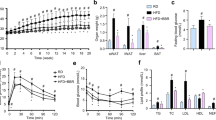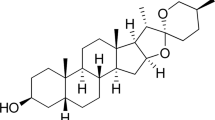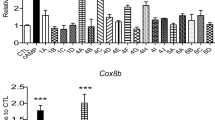Abstract
Objective:
Human obesity is closely associated with a state of chronic low-grade inflammation, which also involves the adipose tissue with enhanced production of bioactive substances (adipokines). Calorie restriction (CR) reduces adipocytokine production and improves metabolic profile in rodents. Some of these effects are mediated through activation of the sirtuin 1 (Sirt1) enzyme, and in this study, we investigate whether the natural phytoalexin, resveratrol (RSV), which is a potent Sirt1 activator, has anti-inflammatory effects in human adipose tissue explants.
Design:
The effect of RSV on interleukin 1β (IL1β)-induced change of adipokine mRNA gene expression and secretion were measured in human adipose tissue explants.
Results:
Exposure of human adipose tissue in vitro to IL1β for 24 h increased secretion of the proinflammatory adipokines IL6, IL8 and monocyte chemoattractant protein 1 (MCP-1) 3–7.7-fold (P<0.05) and increased IL6, IL8, MCP-1, IL1β and PAI-1 mRNA expression 1.3–7.2-fold (P<0.05) accordingly. Concomitant incubations with RSV reversed the IL1β-stimulated secretion (16–36%) and gene expression (25–48%) of these adipokines. IL1β reduced adiponectin mRNA expression (40%), a decrement that was reversed by RSV treatment. Similar effects were observed in differentiated human preadipocytes in primary culture, indicating that human adipocytes are a potential target for RSV effects. Finally, the effects were neutralized by sirtinol, a Sirt1 inhibitor.
Conclusion:
This study is the first to show anti-inflammatory effects of RSV on adipokine expression and secretion in human adipose tissue in vitro through the SIRT1 pathway. Thus, RSV is hypothesized to possess beneficial effects and might improve the metabolic profile in human obesity.
This is a preview of subscription content, access via your institution
Access options
Subscribe to this journal
Receive 12 print issues and online access
$259.00 per year
only $21.58 per issue
Buy this article
- Purchase on Springer Link
- Instant access to full article PDF
Prices may be subject to local taxes which are calculated during checkout




Similar content being viewed by others
References
Ingram DK, Zhu M, Mamczarz J, Zou S, Lane MA, Roth GS et al. Calorie restriction mimetics: an emerging research field. Aging Cell 2006; 5: 97–108.
Ingram DK, Anson RM, de Cabo R, Mamczarz J, Zhu M, Mattison J et al. Development of calorie restriction mimetics as a prolongevity strategy. Ann NY Acad Sci 2004; 1019: 412–423.
Bordone L, Guarente L . Calorie restriction, SIRT1 and metabolism: understanding longevity. Nat Rev Mol Cell Biol 2005; 6: 298–305.
McCay CM, Crowell MF, Maynard LA . The effect of retarded growth upon the length of life span and upon the ultimate body size. 1935. Nutrition 1989; 5: 155–171.
Heilbronn LK, Ravussin E . Calorie restriction and aging: review of the literature and implications for studies in humans. Am J Clin Nutr 2003; 78: 361–369.
Walford RL, Mock D, Verdery R, MacCallum T . Calorie restriction in biosphere 2: alterations in physiologic, hematologic, hormonal, and biochemical parameters in humans restricted for a 2-year period. J Gerontol A Biol Sci Med Sci 2002; 57: B211–B224.
Lin SJ, Defossez PA, Guarente L . Requirement of NAD and SIR2 for life-span extension by calorie restriction in Saccharomyces cerevisiae. Science 2000; 289: 2126–2128.
Picard F, Kurtev M, Chung N, Topark-Ngarm A, Senawong T, hado de Oliveira R et al. Sirt1 promotes fat mobilization in white adipocytes by repressing PPAR-[gamma]. Nature 2004; 429: 771–776.
Howitz KT, Bitterman KJ, Cohen HY, Lamming DW, Lavu S, Wood JG et al. Small molecule activators of sirtuins extend Saccharomyces cerevisiae lifespan. Nature 2003; 425: 191–196.
Pedersen SB, Olholm J, Paulsen SK, Bennetzen MF, Richelsen B . Low Sirt1 expression, which is upregulated by fasting, in human adipose tissue from obese women. Int J Obes 2008; 32: 1250–1255.
Baur JA, Pearson KJ, Price NL, Jamieson HA, Lerin C, Kalra A et al. Resveratrol improves health and survival of mice on a high-calorie diet. Nature 2006; 444: 337–342.
Deng JY, Hsieh PS, Huang JP, Lu LS, Hung LM . Activation of estrogen receptor is crucial for resveratrol-stimulating muscular glucose uptake via both insulin-dependent and -independent pathways. Diabetes 2008; 57: 1814–1823.
Gonzales A, Orlando R . Curcumin and resveratrol inhibit nuclear factor-kappaB-mediated cytokine expression in adipocytes. Nutr Metab 2008; 5: 17.
Despres JP, Lemieux I . Abdominal obesity and metabolic syndrome. Nature 2006; 444: 881–887.
Yudkin JS, Stehouwer CDA, Emeis JJ, Coppack SW . C-Reactive protein in healthy subjects: associations with obesity, insulin resistance, and endothelial dysfunction: a potential role for cytokines originating from adipose tissue? Arterioscler Thromb Vasc Biol 1999; 19: 972–978.
Tilg H, Moschen AR . Adipocytokines: mediators linking adipose tissue, inflammation and immunity. Nat Rev Immunol 2006; 6: 772–783.
Bruun JM, Verdich C, Toubro S, Astrup A, Richelsen B . Association between measures of insulin sensitivity and circulating levels of interleukin-8, interleukin-6 and tumor necrosis factor-alpha. Effect of weight loss in obese men. Eur J Endocrinol 2003; 148: 535–542.
Hotamisligil GS, Arner P, Caro JF, Atkinson RL, Spiegelman BM . Increased adipose tissue expression of tumor necrosis factor-alpha in human obesity and insulin resistance. J Clin Invest 1995; 95: 2409–2415.
Feve B, Bastard JP . The role of interleukins in insulin resistance and type 2 diabetes mellitus. Nat Rev Endocrinol 2009; 5: 305–311.
Weisberg SP, McCann D, Desai M, Rosenbaum M, Leibel RL, Ferrante AW . Obesity is associated with macrophage accumulation in adipose tissue. J Clin Invest 2003; 112: 1796–1808.
Trayhurn P, Wood IS . Signalling role of adipose tissue: adipokines and inflammation in obesity. Biochem Soc Trans 2005; 33 (Part 5): 1078–1081.
Lagathu C, Yvan-Charvet L, Bastard JP, Maachi M, Quignard-Boulangé A, Capeau J et al. Long-term treatment with interleukin-1β induces insulin resistance in murine and human adipocytes. Diabetologia 2006; 49/9: 2162–2173.
Lihn AS, Bruun JM, He G, Pedersen SB, Jensen PF, Richelsen B . Lower expression of adiponectin mRNA in visceral adipose tissue in lean and obese subjects. Mol Cell Endocrinol 2004; 219: 9–15.
Scherer PE, Williams S, Fogliano M, Baldini G, Lodish HF . A novel serum protein similar to C1q, produced exclusively in adipocytes. J Biol Chem 1995; 270: 26746–26749.
Berg AH, Combs TP, Scherer PE . ACRP30/adiponectin: an adipokine regulating glucose and lipid metabolism. Trends Endocrinol Metab 2002; 13: 84–89.
Trujillo ME, Scherer PE . Adiponectin—journey from an adipocyte secretory protein to biomarker of the metabolic syndrome. J Intern Med 2005; 257: 167–175.
Yamauchi T, Kamon J, Waki H, Terauchi Y, Kubota N, Hara K et al. The fat-derived hormone adiponectin reverses insulin resistance associated with both lipoatrophy and obesity. Nat Med 2001; 7: 941–946.
Kadowaki T, Yamauchi T, Kubota N, Hara K, Ueki K, Tobe K . Adiponectin and adiponectin receptors in insulin resistance, diabetes, and the metabolic syndrome. J Clin Invest 2006; 116: 1784–1792.
Flower L, Gray R, Pinkney J, Mohamed-Ali V . Stimulation of interleukin-6 release by interleukin-1[beta] from isolated human adipocytes. Cytokine 2003; 21: 32–37.
Zeyda M, Stulnig TM . Adipose tissue macrophages. Immunol Lett 2007; 112: 61–67.
Dahlman I, Kaaman M, Olsson T, Tan GD, Bickerton AST, Wahlen K et al. A unique role of monocyte chemoattractant protein 1 among chemokines in adipose tissue of obese subjects. J Clin Endocrinol Metab 2005; 90: 5834–5840.
Ahn J, Lee H, Kim S, Ha T . Resveratrol inhibits TNF-[alpha]-induced changes of adipokines in 3T3-L1 adipocytes. Biochem Biophys Res Commun 2007; 364: 972–977.
Zhu J, Yong W, Wu X, Yu Y, Lv J, Liu C et al. Anti-inflammatory effect of resveratrol on TNF-[alpha]-induced MCP-1 expression in adipocytes. Biochem Biophys Res Commun 2008; 369: 471–477.
Boissy P, Andersen TL, Abdallah BM, Kassem M, Plesner T, Delaisse JM . Resveratrol inhibits myeloma cell growth, prevents osteoclast formation, and promotes osteoblast differentiation. Cancer Res 2005; 65: 9943–9952.
Hotamisligil GS . Inflammation and metabolic disorders. Nature 2006; 444: 860–867.
Milne JC, Lambert PD, Schenk S, Carney DP, Smith JJ, Gagne DJ et al. Small molecule activators of SIRT1 as therapeutics for the treatment of type 2 diabetes. Nature 2007; 450: 712–716.
Yeung F, Hoberg JE, Ramsey CS, Keller MD, Jones DR, Frye RA et al. Modulation of NF-kappaB-dependent transcription and cell survival by the SIRT1 deacetylase. EMBO J 2004; 23: 2369–2380.
Pedersen SB, Fuglsig S, Sjogren P, Richelsen B . Identification of steroid receptors in human adipose tissue. Eur J Clin Invest 1996; 26: 1051–1056.
Bruun JM, Pedersen SB, Richelsen B . Regulation of interleukin 8 production and gene expression in human adipose tissue in vitro. J Clin Endocrinol Metab 2001; 86: 1267–1273.
Matsushita K, Yatsuya H, Tamakoshi K, Wada K, Otsuka R, Takefuji S et al. Comparison of circulating adiponectin and proinflammatory markers regarding their association with metabolic syndrome in Japanese men. Arterioscler Thromb Vasc Biol 2006; 26: 871–876.
Wang LX, Heredia A, Song H, Zhang Z, Yu B, Davis C et al. Resveratrol glucuronides as the metabolites of resveratrol in humans: characterization, synthesis, and anti-HIV activity. J Pharm Sci 2004; 93: 2448–2457.
Park HJ, Yang JY, Ambati S, Della-Fera MA, Hausman DB, Rayalam S et al. Combined effects of genistein, quercetin, and resveratrol in human and 3T3-L1 adipocytes. J Med Food 2008; 11: 773–783.
Acknowledgements
The expert technical assistance of Lenette Pedersen and Pia Hornbek is appreciated. The study was part of the DanORC consortium. DanOrc is supported by the Danish Council for Strategic Research. The study was supported by grants from NovoNordisk Foundation and the Danish Medical Research Council.
Author information
Authors and Affiliations
Corresponding author
Ethics declarations
Competing interests
The authors declare no conflict of interest.
Rights and permissions
About this article
Cite this article
Ølholm, J., Paulsen, S., Cullberg, K. et al. Anti-inflammatory effect of resveratrol on adipokine expression and secretion in human adipose tissue explants. Int J Obes 34, 1546–1553 (2010). https://doi.org/10.1038/ijo.2010.98
Received:
Revised:
Accepted:
Published:
Issue Date:
DOI: https://doi.org/10.1038/ijo.2010.98
Keywords
This article is cited by
-
Resveratrol displays anti-inflammatory properties in an ex vivo model of immune mediated inflammatory arthritis
BMC Rheumatology (2018)
-
Neurobehavioural evaluation of resveratrol in murine models of anxiety and schizophrenia
Metabolic Brain Disease (2017)
-
Influence of resveratrol on endoplasmic reticulum stress and expression of adipokines in adipose tissues/adipocytes induced by high-calorie diet or palmitic acid
Endocrine (2017)
-
Adipose tissue macrophages: going off track during obesity
Diabetologia (2016)
-
Effect of resveratrol and orchidectomy on the vasorelaxing influence of perivascular adipose tissue
Heart and Vessels (2016)



